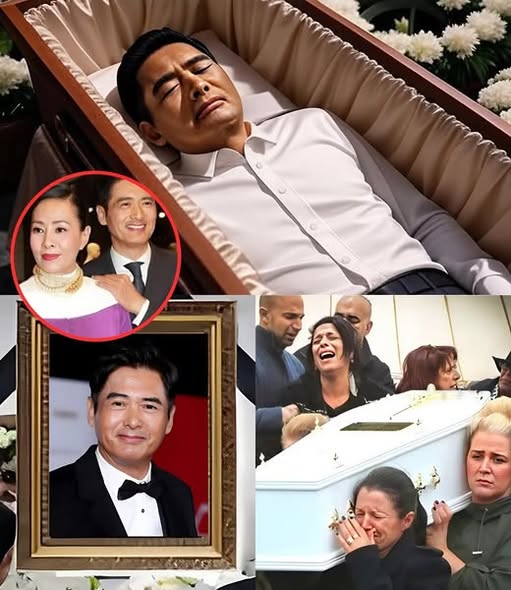
By Yongji Han | Hong Kong | November 8, 2025
A somber silence has fallen over the world of cinema. Just thirty minutes ago, Jasmine Tan, the wife of legendary Hong Kong actor Chow Yun-fat, spoke publicly for the first time in months — confirming that the beloved “God of Gamblers” star is battling a serious health condition that has quietly worsened in recent weeks.
The statement, simple yet heartbreaking, was shared with local media in Hong Kong, and has since been echoed across every corner of the entertainment world.
“He is in treatment, and as always, he faces everything with calm, humor, and gratitude,” Ms. Tan said softly. “We are taking it one day at a time. He told me not to worry — to keep smiling, because that’s how he wants to be remembered.”
Her words, calm but trembling, struck the hearts of millions. For decades, Chow Yun-fat has been more than an actor — he has been a symbol of grace, humility, and cinematic brilliance. Now, as the curtain falls on one of the most enduring figures in Asian cinema, fans and colleagues alike find themselves united in prayer, reflection, and profound sadness.
A Star Who Defined Generations
Born in Lamma Island, Hong Kong, in 1955, Chow Yun-fat’s rise to stardom is one of the most inspiring in film history. From humble beginnings — the son of a ferry worker — he grew up in public housing, often helping his family make ends meet. But even then, his charisma was unmistakable.
He joined TVB’s Artist Training Program in the 1970s, where he quickly became a household name through popular television dramas like “The Bund” — a series that made him a cultural phenomenon across Asia.
It was in the 1980s and 1990s, however, that Chow ascended to cinematic immortality. Partnering with director John Woo, he became the face of Hong Kong’s “heroic bloodshed” genre, redefining what it meant to be a movie hero. Films such as “A Better Tomorrow” (1986), “The Killer” (1989), and “Hard Boiled” (1992) blended poetry and violence, loyalty and loss — with Chow at the center, embodying the tragic elegance of men bound by honor.
Then came “God of Gamblers” (1989) — the film that forever branded him as the suave, unshakable icon of cool. Dressed in a sharp tuxedo, cigarette in hand, and a knowing smile beneath his dark shades, Chow became the face of a cinematic era.
Hollywood soon came calling. In “The Replacement Killers” (1998), “Anna and the King” (1999), and “Crouching Tiger, Hidden Dragon” (2000), he brought the same depth and quiet power to global audiences. He transcended language, becoming one of the few Asian actors to bridge East and West without losing authenticity.
“He could make silence speak louder than a monologue,” said director Ang Lee, who worked with Chow on “Crouching Tiger, Hidden Dragon.” “Every glance, every pause, was art.”

The Gentle Giant Behind the Legend
Off-screen, Chow Yun-fat’s reputation was even more extraordinary. Despite global fame and a career spanning over four decades, he lived a life of remarkable simplicity.
He was often seen taking public transport in Hong Kong, dining in small local restaurants, or walking through markets with a humble smile. In interviews, he often joked that happiness was not found in fame, but in the small, quiet moments of life.
Perhaps most famously, Chow pledged to donate nearly his entire fortune — estimated at over US$700 million — to charity. “Money isn’t something you can take with you,” he once said. “The real joy in life is helping others.”
His wife, Jasmine Tan, once described him as “a man who could live with nothing but still feel like he has everything.”
Those who know him personally describe a man of warmth and humor — a presence that made everyone, from co-stars to waiters, feel valued.
“He’s a legend who never acted like one,” said actor Tony Leung Chiu-wai, reflecting on their early TVB days. “Fame never changed him. He always bowed to elders, smiled at strangers, and thanked every crew member by name.”

The Announcement: A Family’s Quiet Battle
Today’s revelation did not come as part of a press conference or a formal medical update — but rather, through a soft-spoken moment of honesty. Jasmine Tan, who has been by Chow’s side for over three decades, reportedly spoke with emotion while attending a charity luncheon in Central Hong Kong.
When asked about her husband’s absence from public events this year, she paused before saying:
“He’s been unwell. But he’s fighting with the same grace that has carried him through life. He still wakes up early to read, to walk, and to meditate. He tells me, ‘Every day is a gift.’”
Close friends later confirmed to local reporters that Chow has been receiving treatment for a serious but undisclosed condition, believed to be related to complications from a long-term illness he has privately managed for years.
Out of respect for the family’s wishes, media outlets have refrained from speculation — a rare show of solidarity in a world often driven by sensationalism.
A World United in Concern
Within minutes of Ms. Tan’s remarks, tributes and messages of support flooded social media.
The hashtag #PrayForChowYunFat began trending across Hong Kong, Taiwan, Singapore, and mainland China. Fans shared photos, movie clips, and quotes from his most beloved roles — many accompanied by heartfelt captions: “You gave our generation courage,” “The world still needs your smile,” “Our hero, always.”
Fellow stars also expressed their affection and concern.
Andy Lau, a longtime friend and co-star, wrote:
“He taught us what dignity looks like, both on and off screen. His strength inspires us now more than ever.”
Michelle Yeoh shared a message on Instagram:
“He has always carried himself with light and laughter. Let’s all send him that same light now.”
Even fans in Hollywood and Europe joined the wave of support. Director James Cameron reposted a photo from “Crouching Tiger, Hidden Dragon,” writing:
“One of cinema’s great gentlemen. His art crossed oceans; his humanity connected hearts.”

The Man Who Chose Simplicity Over Stardom
In recent years, Chow Yun-fat has largely withdrawn from the spotlight. Though he appeared in select projects like “Project Gutenberg” (2018) and “One More Chance” (2023), he increasingly dedicated time to hiking, photography, and volunteering.
He was often spotted hiking the MacLehose Trail, greeting fans who were astonished by his humility. Dressed simply in sportswear and carrying a small backpack, he would stop for photos and chat about health, nature, or philosophy.
“He’d tell us to take care of our parents and drink more water,” a fan joked on social media tonight. “That’s who he is — everyone’s friendly uncle, not a distant star.”
Even during his illness, Ms. Tan revealed that he continues to find peace in routine. “He reads, listens to old music, and watches comedies,” she said. “He doesn’t want sadness around him. He still laughs every day.”
A Legacy Carved in Humanity
Chow Yun-fat’s impact extends beyond his 70-plus films. He redefined masculinity for a generation — showing that power and vulnerability could coexist. He elevated Hong Kong cinema to international acclaim, inspiring filmmakers and actors worldwide.
Film scholar David Bordwell once described him as “an actor who could express entire philosophies through posture alone.” His performances weren’t just about dialogue or gunplay — they were meditations on loyalty, honor, and loss.
Beyond film, Chow became a moral compass in an era of celebrity excess. His humility, charity, and refusal to let fame consume him turned him into a cultural role model. In a society increasingly defined by wealth and speed, he represented stillness — a reminder of what truly matters.
“He taught us that kindness is the greatest success,” said Hong Kong cultural critic Clara Ng. “That will be his real legacy.”

Privacy, Respect, and the Human Story
In a rare show of journalistic restraint, major outlets across Asia have echoed Ms. Tan’s request for privacy. The Hong Kong Film Association released a statement urging fans and reporters alike to “allow Chow Yun-fat the dignity he has always shown the world.”
“He has given his entire life to film and to people,” the statement read. “Now, let us give him the peace to rest and recover.”
This tone of compassion feels fitting for a man who spent decades using his fame not to build walls, but to bridge hearts.
A Farewell Framed in Hope
As night falls over Hong Kong, candles flicker outside the Broadway Cinematheque — where fans have gathered silently, leaving flowers, handwritten notes, and stills from “A Better Tomorrow.” In the cool November air, one note reads: “You taught us to live with honor. Now we send you our strength.”
Though the world of cinema is reeling from the news, hope remains. Those close to Chow say he continues to face his battle with humor, humility, and faith — the same qualities that made him beloved worldwide.
His wife ended her brief statement with one final reflection:
“He says life has given him more than enough — love, friendship, and a chance to make people smile. He’s grateful for every sunrise.”
Eternal Grace
Chow Yun-fat’s life has always been a story about more than fame. It’s a story about humanity — about how one man can touch millions simply by being kind.
Even now, as he faces one of life’s greatest tests, his journey continues to teach us something profound: that true greatness is not in the applause, but in the quiet grace with which one endures.
The world stands still tonight — united in admiration, prayer, and gratitude.
Because no matter what comes next, the legend of Chow Yun-fat will remain — not just in film, but in the hearts of those who learned from his light.



